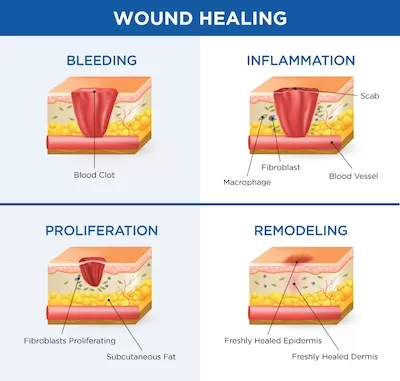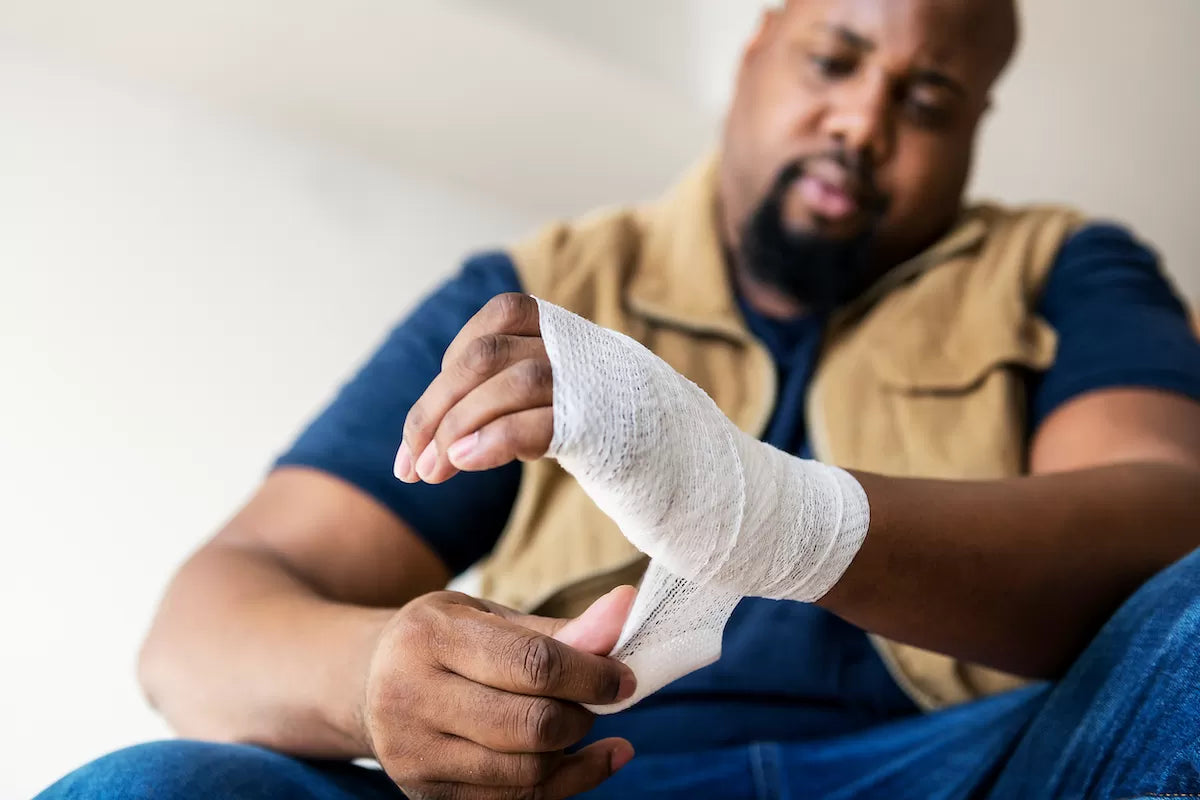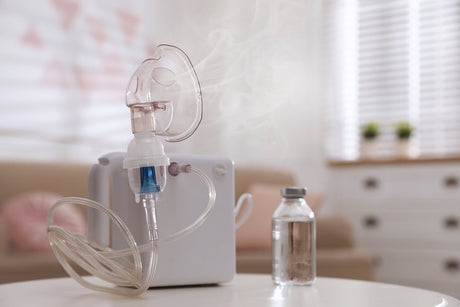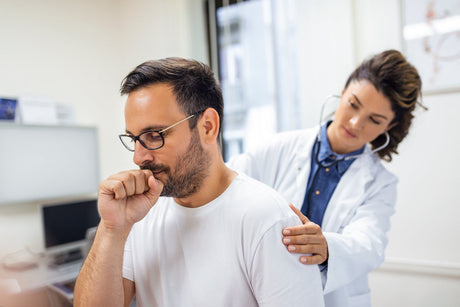Wound healing is the process by which your body restores the integrity and function of damaged tissues. It is a complex and dynamic phenomenon that involves multiple cells, molecules, and elements. Wound healing can be influenced by many factors, such as the type, size, and location of the wound, the presence of infection or inflammation, the nutritional status and general health of the individual, and the treatment applied to the wound.
What are the types of wound healing?
There are two main types of wound healing: primary and secondary.
Primary wound healing occurs when the edges of the wound are close together and can be sutured, stapled, or glued. This type of wound healing results in minimal scarring and faster healing. Examples of wounds that heal by primary intention include surgical incisions, minor cuts, and punctures.
Secondary wound healing occurs when the edges of the wound are far apart or there is a large amount of tissue loss. This type of wound healing requires more time and resources from the body, as it involves filling the wound with granulation tissue (a new tissue that forms at the base of the wound), contracting the wound edges, and covering the wound with epithelial cells (the cells that line the skin and other organs). Examples of wounds that heal by secondary intention include burns, ulcers, and large open wounds.
Shop our range of wound care products here
What are the stages of wound healing?
Wound healing can be divided into four overlapping phases: hemostasis, inflammation, proliferation, and remodeling.
Hemostasis
Hemostasis is the first phase of wound healing and it occurs immediately after injury. The main goal of this phase is to stop bleeding from the damaged blood vessels. This is achieved by the blood vessels near the wound constricting to reduce blood flow and blood loss. Then platelets stick together and form a plug at the site of injury. Next, the coagulation cascade is activated and produces fibrin (a mesh-like structure) that reinforces the platelet plug and forms a stable clot.
Inflammation
Inflammation is the second phase of wound healing and it lasts for several days. The main goal of this phase is to clear the wound from debris, bacteria, and dead cells, and to prepare the wound for healing.
Proliferation
Proliferation is the third phase of wound healing and it lasts for several weeks. The main goal of this phase is to fill the wound with new tissue and close the wound.
Remodeling
Remodeling is the fourth and last step in the phases of wound healing and it can last for months or years. The main goal of this phase is to restore the strength and function of the healed tissue. This is achieved by two processes, one of which is called collagen remodeling. This process increases the tensile strength of the scar tissue and reduces its volume and thickness.
The second process is scar maturation, whereby scar tissue becomes more similar to normal tissue in terms of appearance, color, texture, and function. Scar maturation depends on many factors, such as the type and location of the wound, the age and health of the individual, and the treatment applied to the wound. Generally, scars tend to fade over time, but they never completely disappear.

What are the factors affecting wound healing?
Wound healing can be affected by many factors, both intrinsic (within the individual) and extrinsic (outside the individual). Some of these factors are:
- Age: Aging is associated with decreased blood flow, reduced immune function, impaired collagen synthesis, and delayed epithelialization. These changes can slow down wound healing and increase the risk of infection and chronic wounds.
- Nutrition: Nutrition is essential for wound healing, as it provides energy, oxygen, and building blocks for tissue repair. Some nutrients that are particularly important for wound healing are protein, vitamin C, zinc, iron, and copper. Shop for wound care nutrition
- Diabetes: Diabetes is a chronic condition that affects blood sugar levels and can cause damage to various organs and tissues. Diabetes can impair wound healing by causing neuropathy (nerve damage), and microangiopathy (small blood vessel damage). Diabetic wounds are more prone to infection and chronicity. Shop for diabetic wound care products
- Smoking: Smoking is a harmful habit that affects many aspects of health. Smoking can impair wound healing by causing vasoconstriction (reduced blood flow), hypoxia (low oxygen levels), impaired immune function, increased inflammation, and increased risk of infection and chronic wounds.
- Medications: Some medications can affect wound healing by interfering with various processes involved in tissue repair. For example, steroids can reduce inflammation but also impair immune function. Anticoagulants can prevent clotting but also increase bleeding and hematoma formation. Chemotherapy can kill cancer cells but also damage healthy cells and impair immune function.
- Infection: Infection is a common complication of wounds that occurs when bacteria or other microorganisms invade the wound site. Infection can impair wound healing by increasing inflammation, tissue damage, necrosis (cell death), exudate (fluid leakage), pain, odor, and fever. Infection can also lead to systemic complications such as sepsis (blood poisoning) or gangrene (tissue death). If you’re experiencing wound healing with yellow tissue, it may indicate improper healing and it’s best to consult with a healthcare practitioner.
How to heal wounds faster
Proper wound care is essential for facilitating a rapid and smooth healing process. To care for wounds effectively, start by keeping the area clean and free from debris by gently washing it with mild soap and water. Cover the wound with a sterile bandage to protect it from potential infection and irritation. Ensure your diet is rich in essential nutrients like vitamins, minerals, and protein to support tissue repair and stay adequately hydrated by drinking at least eight glasses of water daily. Additionally, avoid habits like smoking and excessive alcohol consumption, as they can significantly hinder the body's ability to heal. Lastly, always follow the guidance of your healthcare provider, which may include prescribed medications and specific wound care instructions, to optimize your wound's healing potential.
Help wound healing happen
Understanding how the body repairs tissue through wound healing is essential for anyone seeking to facilitate a smoother recovery from injuries or surgeries. By following the phases of wound healing, considering influencing factors, and implementing practical tips, you can actively contribute to your body's natural healing process. Remember, patience and diligence are key to promoting optimal wound healing.
FAQs:
Q: How long does it take for a wound to heal completely?
The time required for complete wound healing varies depending on factors such as the wound's size, location, and overall health. Minor wounds may heal in a matter of days, while more significant injuries can take weeks to months.
Q: Can I speed up the wound-healing process?
While you can't rush the natural healing process, you can optimize it by maintaining a healthy lifestyle, following proper wound care, and addressing any underlying health issues.
Q: Is scarring inevitable after a wound heals?
Scarring is a natural part of the wound-healing process. However, proper wound care and minimizing stress on the healing area can help reduce the appearance of scars over time.
As a leading supplier of durable and home medical equipment (DME and HME), ApriaHome sources and distributes a wide range of treatment solutions, including wound care supplies and solutions.
We're here to support you as you work toward your improved health and well-being. We strive to meet your ever-evolving healthcare requirements with individualized attention and premium quality treatment solutions.
Looking to add wound care supplies? Browse our premium solutions and let us help you get the most out of every day.
Looking for advice? Our helpful agents are on call at (800) 780-1508 between 8:00 am - 10:00 pm EST daily. Get in touch today.





